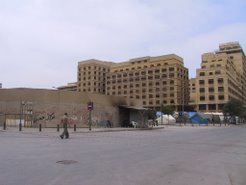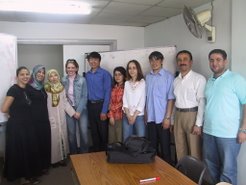Critique of Criticism
...ممكن اكتب شو e باللغة العربية
:المفردات اليوم
تحرَش جنسي
مناسبة
اسلوب
خصخصة
التحرَش جنسي هو مشكلة فيالاجتماعية العربية
المستوة التي موجودة فيها هي تناسب فيي
ما احب الاسلوب الكاتب
يكبر الخصخصة فالاردن
I would like to dedicate this blog post to anybody who has ever used the word "constructive criticism".
Criticism is a judgement derived from thorough observation. Sometimes criticism has a negative meaning: "He never notices the good things in me! He's so critical! I wish he would stop criticizing me because I'm doing the best I can!" Sometimes, criticism can be useful because it can spur change. "His critique of my short story was very helpful; if I can eliminate the passive voice, maybe the storyline will flow easier!" This is what we call "constructive criticism."
I remember the first time I learned the phrase, "constructive criticism." After my 6th grade teacher explained it, she proceeded to point out mistakes that the student had made. Since then, somewhere in my brain I have this connection between, "constructive criticism," and "I did something wrong."
Unfortunately - or fortunately? - I am a perfectionist. I wear concealer to cover my blemishes. I set a high bar for myself, and try to achieve it. As a freshman in high school I made a vow to (try to) never feel ashamed of myself again. Even though I make tons and tons and tons and tons of mistakes, I do not feel ashamed when I know I am doing my best. I pour my whole soul into this Arabic language. I have been blessed with an abnormal amount of tenacity, "stick-to-it-ive-ness." I am constantly critiquing my self, and telling myself what/where/how I can do and be my idea of better.
Criticism is useful when it can lead to positive change. I am infinitely more self-aware than others may think, but I do not claim to know all of my flaws. When Prof. NagiH corrects me, an inevitable occurance in an Arabic as a Second Language class, it's extremely helpful. I learn from correcting my mistakes, moving forward, working from the criticism that he gives me.
Why is Prof. NagiH's criticism more useful to me than, for example, somebody telling me that the pictures on my blog could be better, or that I could be a better writer? Several reasons:
Prof. NagiH is (duh) better than me at Arabic. I absolutely respect his criticism. I believe what he says, and value it.
A certain aforementioned person is not a better writer or photographer than me. His criticism is not from a base of deep knowledge about the subject, but rather his own - albeit informed - average opinion. I do value other people's opinions, but - sorry - I trust opinions of specialists in the designated field more.
[Ceci dit, I need to improve my both my writing and photography.]
Prof. NagiH does a lot of nodding and smiling - go to ANY foreign language class, and you will find that the more positive reinforcement, the more the teacher gives out aseenti-s, tamam-s and momtaz-es, the better the student-teacher relationship will be (not to mention class dynamic), and the more respect the student will have for the teacher's criticism. The main consequence of all this is real learning, and real motivation to continue learning.
Fortunately for linguists and their profession, the subtleties of language are ENDLESS. Words are not the only tool used in communication - and one thing linguists do is define the layers of meaning behind the words.
I am sensitive to these layers.
Prof. NagiH does not think we are stupid. His criticism is to help us learn. It's his job to criticize us. Friends criticizing friends leads me to ask, "why is it important for them to criticize me? What do they want out of it? Is there some hidden implication in what they are trying to tell me?"
For example:
"Kate, your laugh is really loud."
The sentence isn't necessarily just an evaluation of the volume of my laughter. Depending on tone, context, and stress of words, it could mean lots of things.
"Your laugh is really loud and I wish you would shut up."
"Kate, I've told you a million times how loud your laugh is. Do I seriously have to tell you again?"
"Congratulations, Kate, you won the contest for World's Loudest Laugh."
"No, no, I didn't mean your laugh was quiet! It is really loud!"
"You could take better pictures," could mean:
"I expect better from you because you are intelligent and capable!"
"I'm disappointed because I know you aren't doing your best."
"You should be doing better."
"Your pictures suck and I hate them all."
"You should just give up now."
Expressing criticism in a clear and direct way minimizes dangerous misinterpretations/miscommunications.
Language learning is hard. Daunting. Like a mountain. Especially Arabic - you can't fudge your way like French, and, at least for native English speakers, grammatical structures are not second-nature.
Learning a language requires you to recognize both your mistakes and your successes. It's scary to learn that the little lines and circles above the word can change the ENTIRE meaning (ex: from passive to active: "The book was written by Kate." "Kate wrote the book." In arabic, the only difference is the vowelling), and to realize that I haven't EVER payed much attention to them.
If I were to focus all my thoughts on all of the things I don't know about Arabic, I'd be on the next plane out of this country. It would be too difficult. Even I, Kate Vasicek, "Stick-To-It-Like-Super-Glue" fifth-grade motto girl, would give up. People like Prof. NagiH with his infinite patience make this place for me. The "Wow! She speaks Arabic really well!" statements keep me confident, and able to pick myself each time I make a mistake.
I love this language, and I'm going to conquer it. I love the complexities of ammiya (spoken Arabic) and the depth of meaning found in fusHa (written Arabic). I am confident of my ability to learn both, and I will continue to strive to learn.
SUMMARY:
Telling me that I suck motivates me to figure out why you would say so, not how I can change to be better.
Telling me that I am capable of better will not motivate me unless I respect you.
Focusing on my flaws without any acknowledgement of my accomplishments lessens my respect for you.
Arabic is really hard, but a mixture of positive and critical feedback helps me learn.
It would be interesting to analyze the difference between "to critique" and "to criticize" - both denotations and connotations.










2 comments:
would the universe implode if I criticized your critique on criticism?
جنسيّ ؟
Post a Comment